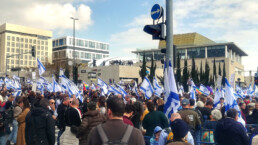Civil resistance against the government has put the Israeli military in an unparalleled crisis, presenting an opportunity for those fighting apartheid.
by Shimri Zameret, +972 Magazine
During the Second Intifada, as the Israeli army was killing thousands of Palestinians in its effort to suppress the uprising, I was part of a movement of Israeli youth and soldiers who refused to serve in the army. From the age of 18 to 20, I spent 21 months under arrest and in prison, alongside many others, in protest of the occupation and its brutal policies. It was one of the largest campaigns of conscientious objection seen in Israel — one that, until recently, seemed very unlikely to occur at such a scale again.
Over the past two weeks, however, and for the first time in two decades, a new movement of Israeli army refusers has emerged in opposition to the far-right government, led by Benjamin Netanyahu, as it advances a slew of anti-democratic legislation. The proposed laws, described as a “judicial coup” by opponents, will severely weaken the country’s courts, giving the ruling coalition almost unlimited power. While impacting the rights of women, LGBTQ people, secular people, and other minorities, it is Palestinians on both sides of the Green Line who will face the heaviest brunt of the legislation.

Against this imminent threat, thousands of Israeli soldiers and reservists have made public statements announcing their intent to refuse army service should the government’s legislation pass. One such statement had over 250 signatures of reserve soldiers, all from the army’s special ops unit, stating the legislation is intent on “making the judicial branch a political and non-independent branch, in other words an end for Israeli democracy.” A second, similar statement of refusal garnered over 500 signatures of reserve soldiers, all from “Unit 8200,” an intelligence unit often compared to the U.S. National Security Agency.
Recent Posts
‘Unconstitutional. Unethical. Authoritarian.’ ICE Bars Millions Of Immigrants From Bond Hearings
July 18, 2025
Take Action Now One watchdog said the new policy “seems like a blatant attempt to stop them from exercising their right to due process.”……
Americans Are Not Nearly Alarmed Enough About Climate Change
July 18, 2025
Take Action Now Americans still don’t comprehend how imminent, dangerous, and far-reaching the threat is—and journalists are partly to blame.By…
The IRS Is Building A Vast System To Share Millions Of Taxpayers’ Data With ICE
July 17, 2025
Take Action Now ProPublica has obtained the blueprint for the Trump administration’s unprecedented plan to turn over IRS records to Homeland Security…
Israel’s Sudden Assault On Syria Is Unchecked Aggression
July 17, 2025
Take Action Now Jerusalem is bombing Damascus and threatening al-Sharaa’s rule, while Washington was hoping to help the nascent government on…




